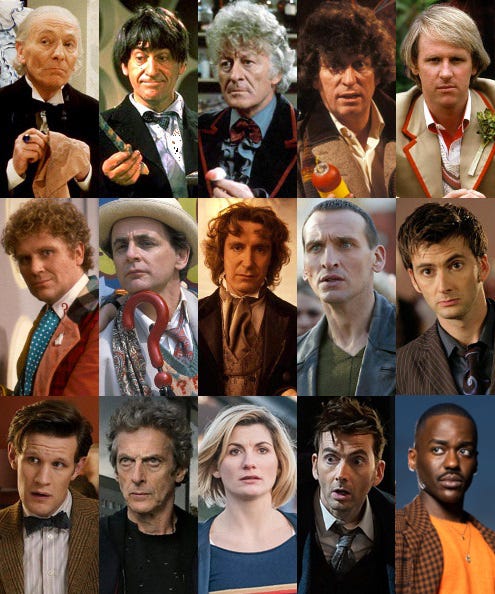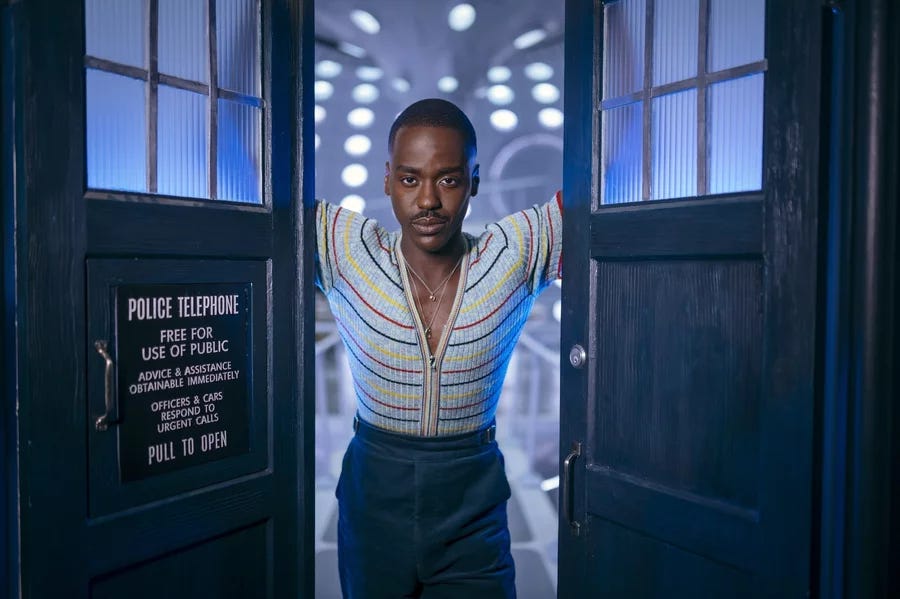Why identity will always matter on 'Doctor Who'
Those who complain about the 62-year-old TV franchise being too woke are entirely missing the point
When it comes to the 60-plus-year-old science fiction franchise that is Doctor Who, I have always maintained that the show has one, simple truth:
The time-traveling, gender and race bending alien who gives the show its name, a 2000-plus-year-old being known as The Doctor, is usually the most interesting element of any story told there.
Showrunners who have shied away from this essential notion have often lived to regret it. Much as I loved the actress Jodie Whittaker – and I, admittedly, did not stay as engaged with the show as I wanted to when she was its star – I never felt she and showrunner Chris Chibnall really engaged with who The Doctor was during her tenure.
(Jodie Whittaker as the 13th Doctor.)
This was particularly disappointing, given that the character was finally being played by a woman after more than 50 years’ worth of male stars (The Doctor, as fans know, “regenerates” into a new body every so often, allowing the show to engage in a reboot of sorts by switching out the lead performer.) And since some fans of Doctor Who have felt female characters got short shrift from the series in seasons past, it seemed a seriously missed opportunity.
(All the Doctors who led the TV series - and one TV movie - over the show’s history. Almost all men. Almost all white.)
That’s why I was so delighted to see the Pop Culture Happy Hour crew last week re-air our wonderful discussion about the Ncuti Gatwa Era of Doctor Who, in which a Black, queer actor who was not born in Great Britain has taken over the role. When you do click here and listen to the proceedings, you’ll hear sci fi master Glen Weldon host a gathering of blerds – yes, Black nerds – completely tripping over the idea that someone who looks like us is now standing at the center of one of the biggest science fiction franchises in television history.
We taped our discussion last year before very many episodes in Gatwa’s first season as The Doctor aired. Now Disney+ has begun airing episodes from his second season, introducing his new human companion Belinda Chandra, played by Varada Sethu.
Thanks to that Disney money, the production is sharp enough to draw blood, with expansive sets, eye-popping effects and costuming that makes Gatwa one of the most stylish actors to ever step inside the TARDIS. (click here if you didn’t get that reference) But Gatwa’s Doctor is traumatized and way too busy adventure-hopping to spend much time considering his fate as an orphan who might also be one of the most powerful beings in the universe.
I’m a graybeard fan who has been clocking Doctor Who episodes since I discovered the show in the mid 1970s -- thanks to Chicago PBS station WTTW, which aired episodes featuring the Fourth Doctor, Tom Baker. Back then, I had a fondness for know-it-all, fuzzy-haired British eccentrics – I was a stone Monty Python fan back then, too, which really flummoxed all my neighbors in Gary, Indiana.
Like a lot of Doctor Who fans, I saw the triumph of geeky cool, silly wit and earnest anti-cynicism in The Doctor’s antics. I saw a character who embodied a message I already believed in my bones: Nerds are secretly the coolest people in the room, and we will one day rule the universe.
Flash forward 50 years and some of the details in that prediction haven’t worked out so well – who knew real life nerds like Elon Musk and Jeff Bezos would turn out to be more Bond villain and Lex Luthor than Tony Stark and Professor X? But the way The Doctor has provided a fun, flambouyant and smart-centric hero for generations has always been a boon to pop culture.
I spoke to Gatwa about his historic status last year, and he was pretty sanguine about those bent out of shape to see a openly queer, Black man playing a hero historically played by white people. “"I don't want to diminish racial aggression at all," he said. "But for me, personally, I find it fascinating that it matters so much to these people. ... You are going to limit yourselves from a show that ... you claim to love ... because you don't like something about someone's appearance or their race. It's just ... really sad for them."
One of the delightful contradictions of Doctor Who, is that — despite being a time and galaxy-hopping alien with adventures usually far away from Earth — The Doctor is unfailingly British, often interacting with cultures that are steeped in Britishisms. Gatwa’s episodes have seemed to nod a bit more toward queerness, though the most recent episode, set in 1952-era Miami, deftly plays off how people then would react to a whip smart Black man showing up out of nowhere (and also has a wonderfully cheeky nod to the show’s obsessive fans which must be seen to be believed.)
So, even though the show is often set in the stars, it is also super focused on humanity - especially the British version.
And showing there’s a place in science fiction for people who aren’t white, male or heterosexual to share the spotlight and stand center stage — well, that’s a kind of equality which can help inspire people to excel in the real world.
Which is something critics of so-called “wokeness” will never admit. In a world with a long history of elevating certain kinds of people and suppressing others, the surest antidote is elevating those typically overlooked — to wake everyone up to how much better things can be when everyone has a shot at success.







The Doctor is one of the most open-hearted characters ever created, and Ncuti is perfect in that respect. The weird thing about the complaints is that British TV always seemed much more inclusive than American TV. People get so protective of their idea of the character that they don't realize how true to form it is that the regeneration could be anyone in the universe.
If I'm being truly honest, I love Ncuti Gatwa as one of the Kens probably as much as Doctor Who. He DID show up and perform with Gosling at the Oscars.